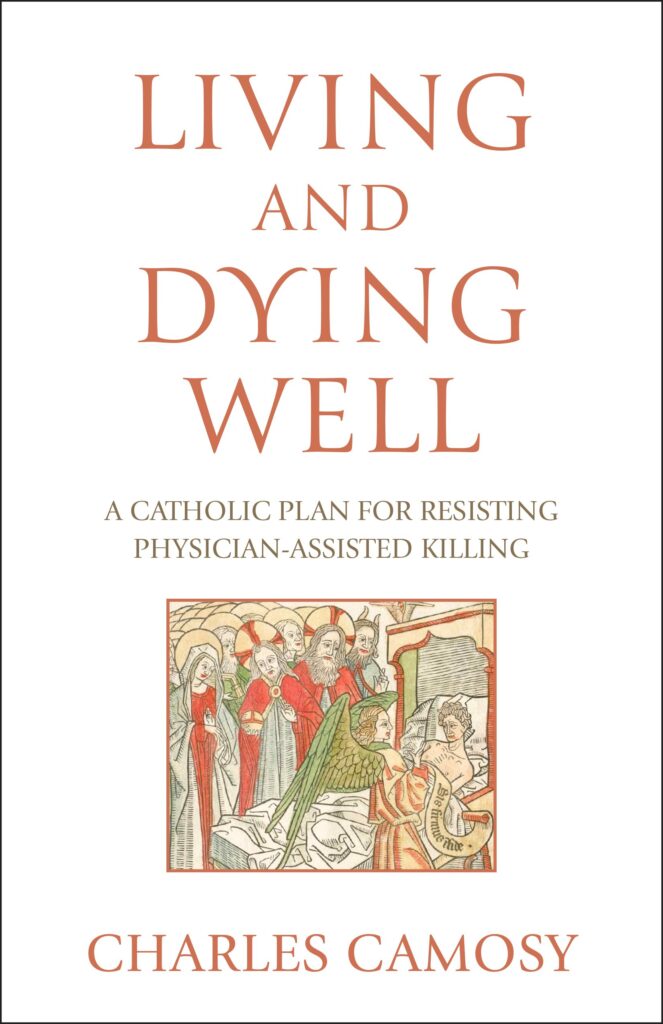
New Book Offers Compelling Arguments Against Culture of Death
By: Our Sunday Visitor
In his latest release, Dr. Charles Camosy argues that euthanasia and physician-assisted suicide are fueled by fear cultivated by modern consumerism and throwaway culture

“Living and Dying Well: A Catholic Plan for Resisting Physician-Assisted Killing” Charles Camosy, Our Sunday Visitor (2025) 184 pages, $20.95
The slogan many proponents and supporters of euthanasia and physician-assisted suicide use to define their cause is “death with dignity.” To suffer, to become a burden on loved ones, and to lose physical and mental control, they say, are an affront to human dignity, and it would be better for some people to be killed quickly and in a manner they can control rather than to go through the natural progression of death.
In his latest book, Charles Camosy argues that these practices are based on a vast misunderstanding of human dignity and are fueled by fear cultivated by modern consumerism and throwaway culture.
“Living and Dying Well: A Catholic Plan for Resisting Physician-Assisted Killing” is an apologia of the Catholic Church’s opposition to what Camosy terms “physician-assisted killing” or PAK, building upon the basics of moral theology regarding end-of-life care, teachings of saints, and the example of monks and friars.
Camosy identifies two opposite errors that are prevalent in our culture, leading to the misguided practice of physician-assisted killing: the fear of death that leads to an obsession with extending life and the idolatry of avoiding suffering to the point where death appears preferable.
Fear of dependency drives end-of-life decisions
While it seems that fear of pain would be one of the primary motives for pursuing physician-assisted killing, the data actually shows that it is not even among the top five reasons.
Instead, people are afraid of having to rely on other people and of their caregivers witnessing their condition deteriorate as they lose control of cognitive and bodily functions. At the core of this fear, Camosy suggests, is a belief that human dignity is dependent on productivity and efficiency, and thus people can lose their dignity when they require more resources than they produce, necessitating the care of others.
Catholic teaching emphasizes inherent human dignity
The Catholic Church’s understanding, however, is that human life is infused with inherent dignity, which is not dependent on physical fitness, dependency on others, or even how much someone enjoys their life.
In the Catholic worldview, there is absolutely nothing that can diminish someone’s dignity because it is God-given. “Living and Dying Well” describes this teaching beautifully and in an approachable manner that is well-supported and convincing.
The remedy for a culture that views someone as an unproductive burden, Camosy presents, is the appreciation of life as a precious gift from God. With this perspective, not only is every moment of life meaningful and valuable, but caring for the life of another is also a supreme privilege.
A person’s last moments are not devastating or dehumanizing; they are actually the pinnacle of human life as someone prepares to enter eternity. Therefore, both the person who knows they are dying and their loved ones and caregivers should have peace as someone enters the end stage of their life when they properly value the inherent dignity of human life.
Practical guidance for resisting the culture of death
The book concludes with practical suggestions for improvements to end-of-life care, ways that individuals can actively oppose physician-assisted killing and support the dignity of life through natural death, and how communities and institutions can get involved in resisting the culture of death. Included in the appendices of “Living and Dying Well” are resources for end-of-life care and preparations, as well as common objections to the opposition of euthanasia and succinct responses to them.
Camosy provides an impactful and digestible resource for anyone curious about the church’s teaching on physician-assisted killing and a convincing roadmap for defending human dignity at all stages of life in “Living and Dying Well.”
The book is clear and compassionate, and grounded in Christian anthropology, offering a powerful opposition to fear around death and dying.
—
Cecilia Cicone is an author and communicator who works in diocesan ministry in Northwest Indiana.

